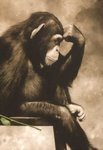
understanding the nature of things
One of the greatest lessons Charles Darwin left us was that, as life goes, we are not the center of the universe. He taught us to take a step back from our busy lives and open our eyes to a reality staring us in the face. The message was –and is- breathtakingly simple: Humanity is not the pinnacle of the biological world; it is only a small part of a vast living landscape. Never before, or since has such a powerful lesson in humility been given to us as a species.
This is a lesson that many seem to be forgetting today; an age where there is an increasing disconnect with nature. It may be that we are letting slip from our grasp the very thing that might save us. Here in the “greatest” democracy the very concept of an educated citizen is fading (at a time when we need him/her the most) in an era of dogmatic beliefs, inflexible attitudes, and myopic compassion
Children are graduating from schools with minimal science knowledge, weak critical thinking tools and their hiking shoes rot in the closet as a virtual world increasingly clamors for attention. Not that it is all bad. Fantastic new and novel horizons are opening up before us. It could be that this is just the way of things as humanity stumbles along, but this schism between us and the rest of the real world is not healthy.
The fact is, our stumbling should be done with a little more balance. For example we could be better connected to our origins, our history, and our environment. There is something to be said for the outdoors - “rolling” in the dirt, smelling the smells, watching the ways of plants and animals. We hear this call all the time but it is more urgent now than ever before.
Dr Miller, a veterinarian and horse trainer, in a poignant article “And they call us horse lovers” laments a loss of genuine connection with animals and nature- even with the ones we live with. He notes “How many people who sincerely consider themselves to be "horse lovers" wean foals at three months of age, or even earlier, which nature never intended? How many horses, a gregarious species, spend their lives locked in box stalls? How many horses in the U.S.A, like so much of our human population, are damaged healthwise by excessive nutrition? Such abuses exist in every breed, every discipline, in every equine sport. We need to step back and analyze what we are doing.”
This is a call for a gentler approach to animal husbandry that goes back to, in this case, observing and emulating a little more closely a horse’s natural behavior. It is a train of thought can be extended out to many other human and animal relationships.
The problem though is that many people are increasingly losing their grip on the reality of nature that
This sad example, though extreme, reflects a disconnect between many people and the world around them. They might go too far; seeing animals through a narrow filter that mixes human traits, emotions, and belief into an unnatural vision that completely misses the point. Granted we all do this but taking it too far becomes destructive.
It is said, that to truly understand ones connection to the world, you need to gather your own food from the source at least once, rear an orphaned animal, and grow a plant from seed. In this way, the connection between sacrificing and sustenance is seared into memory. This creates a powerful bond to the world around us and makes navigating the present sea of dogma a bit easier and our relationship with the life around us clearer.
The world continues to move on and -one way or another- history will inevitably unfold. Whether or not humanity can achieve any level of sustainability has a lot to do with understanding and accepting our place here. Whether this happens or not is up to all of us.
-------------------------------------------
* Dr. London eloquently defends her work towards understanding addiction.




No comments:
Post a Comment